大学英语读写教程
大学英语读写教程一教案
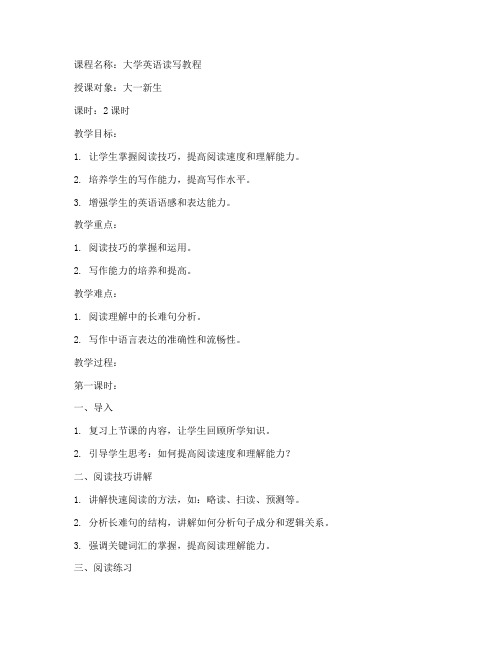
课程名称:大学英语读写教程授课对象:大一新生课时:2课时教学目标:1. 让学生掌握阅读技巧,提高阅读速度和理解能力。
2. 培养学生的写作能力,提高写作水平。
3. 增强学生的英语语感和表达能力。
教学重点:1. 阅读技巧的掌握和运用。
2. 写作能力的培养和提高。
教学难点:1. 阅读理解中的长难句分析。
2. 写作中语言表达的准确性和流畅性。
教学过程:第一课时:一、导入1. 复习上节课的内容,让学生回顾所学知识。
2. 引导学生思考:如何提高阅读速度和理解能力?二、阅读技巧讲解1. 讲解快速阅读的方法,如:略读、扫读、预测等。
2. 分析长难句的结构,讲解如何分析句子成分和逻辑关系。
3. 强调关键词汇的掌握,提高阅读理解能力。
三、阅读练习1. 分组讨论,让学生在小组内进行阅读练习。
2. 针对练习中的问题进行讲解和解答。
四、课堂小结1. 总结本节课所学内容,强调阅读技巧的重要性。
2. 布置课后阅读任务,让学生巩固所学知识。
第二课时:一、导入1. 回顾上节课的内容,让学生谈谈自己的阅读体会。
2. 引导学生思考:如何提高写作水平?二、写作技巧讲解1. 讲解写作的基本结构,如:引言、正文、结论等。
2. 分析写作中的常见错误,如:语法错误、逻辑错误等。
3. 强调语言表达的准确性和流畅性。
三、写作练习1. 分组讨论,让学生在小组内进行写作练习。
2. 针对练习中的问题进行讲解和解答。
四、课堂小结1. 总结本节课所学内容,强调写作技巧的重要性。
2. 布置课后写作任务,让学生巩固所学知识。
教学评价:1. 课堂参与度:观察学生在课堂上的表现,了解他们对阅读和写作的兴趣和积极性。
2. 课后作业完成情况:检查学生的课后阅读和写作任务完成情况,了解他们的学习效果。
3. 课堂提问回答情况:通过提问了解学生对所学知识的掌握程度。
教学反思:1. 根据学生的学习情况和课堂反馈,调整教学策略和方法。
2. 关注学生的个体差异,因材施教,提高教学效果。
大学英语读写教程第3册

Unit 1III1 beneath2 disguised3 whistles4 restrain5 grasp6 longing7 praying8 faithful 9 pledge 10 drainIV1 tell …on you2 track down3 work it out4 picking on me5 reckoned with6 call on7 on his own8 get through9 in disguise 10 revolves aroundVG O D I K L B F A NVI1 advise2 level3 problems4 necessity5 skills6 experience7 solution8 value 9 tool 10 mannerVII1 air-conditioned(装空调的;有冷气的)2 handmade(手工制作的)3 thunderstruck(非常吃惊的)4 heartfelt(衷心于数据的)6 self-employed(自主经营的)7 custom-built(定制的;定做的)8 weather-beaten(饱经风霜的)VIII1. well-informed(对……非常熟悉的)2 new-found(新获得的)3 hard-earned(辛苦挣得的)4 soft-spoken(说婚的)6 widely-held(普遍认为的)7 well-meant(出于好意的)8 well-educated(受过良好教育的)IX1 no matter how different it may seem form any other substance2 no matter what a woman tries to do to improve her situation3 no matter what excuse he gives4 no matter what anyone else may think5 no matter how they rewrite historyX1 just as we gained fame in victory, we lost nothing in defeat2 just as the head teacher plays a significant role in the school, Jane plays a significant role f leader in the classroom.3 whoever was out there obviously couldn’t see him just as he couldn’t see them.4 she has been searching all her life for the perfect chocolate just as I have been searching for the perfect beer.5 you can make those kinds of comparisons just as you were doing the analyses a minute ago.XI1. No matter how experienced a speaker you are, and how well you have prepared your speech, you will have difficulty reception.2. Just as all his sister’s friends cared about him, Jimmy cared about them.3. Car manufacturers stamp a vehicle identification number at several places on new cars to help track down stolen v4. If you dare tell on me when the teacher gets back I won’t say a word to you any more.5. Some elderly people prefer to live on their own while the great majority choose to live with their children.6. Here is something that needs to be reckoned with: how to get the necessary finances to establish the company. XII1. 每当有人帮了你,无论事情大小,无论他地位高低,你都应该对他说声“谢谢”。
大学英语读写教程

大学英语读写教程大学英语读写教程是一本可以帮助学生提高英语读写能力的教材。
通过阅读和写作训练,学生可以增强他们的词汇量和语法知识,并提高他们的阅读理解和写作技巧。
这本教材包含许多不同类型的文章,涵盖了各种不同的主题。
学生可以通过阅读这些文章来了解不同的观点、意见和理论,并了解各种不同的文体和写作风格。
这些文章还包括有趣的故事、新闻报道、科学研究、社会问题等,涉及的领域广泛。
在读方面,教材提供了一些阅读理解练习,以帮助学生提高他们的理解能力。
这些练习包括填空、多项选择题、判断题等,可以帮助学生更好地理解文章的内容,并学会通过上下文推测词义和主旨。
此外,教材还提供了一些阅读领域相关的词汇和短语,以帮助学生扩大他们的词汇量。
在写方面,教材提供了一些写作练习,以帮助学生提高他们的写作技巧。
这些练习包括写作摘要、写作概述、写作议论文等,可以帮助学生提高他们的逻辑思维和组织能力。
此外,教材还提供了一些写作方面相关的语法和句型,以帮助学生提高他们的写作水平。
需要注意的是,大学英语读写教程并不仅仅是一本教材。
它还是一个学习工具,学生们可以自己学习和独立思考。
学生们可以通过阅读和写作练习来提高他们的英语水平,并将所学知识应用到实际生活中。
此外,教材还提供了一些额外的资源,如听力材料和在线练习,以帮助学生更好地学习和巩固所学的知识。
总之,大学英语读写教程是一本非常重要的教材,它通过阅读和写作训练帮助学生提高他们的英语读写能力。
在教材的指导下,学生们可以扩大他们的词汇量、提高他们的阅读理解和写作技巧,并将所学知识应用到实际生活中。
通过不断的学习和实践,学生们可以逐渐提高他们的英语水平,为他们的大学学习和未来的工作做好准备。
最新新视野大学英语读写教程Unit-1-教案(含答案和译文)
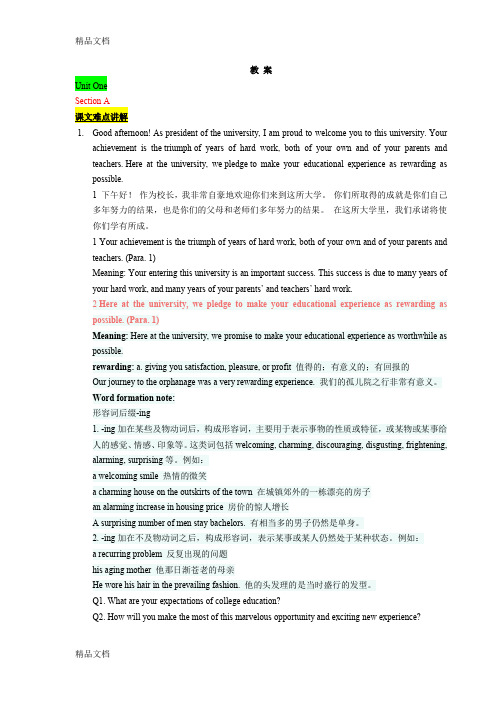
教案Unit One1.Good afternoon! As president of the university, I am proud to welcome you to this university. Yourachievement is the triumph of years of hard work, both of your own and of your parents and teachers. Here at the university, we pledge to make your educational experience as rewarding as possible.1 下午好!作为校长,我非常自豪地欢迎你们来到这所大学。
你们所取得的成就是你们自己多年努力的结果,也是你们的父母和老师们多年努力的结果。
在这所大学里,我们承诺将使你们学有所成。
1 Your achievement is the triumph of years of hard work, both of your own and of your parents andteachers. (Para. 1)Meaning: Your entering this university is an important success. This success is due to many years of your hard work, and many years of your parents’ and teachers’ hard work.2 Here at the university, we pledge to make your educational experience as rewarding aspossible. (Para. 1)Meaning: Here at the university, we promise to make your educational experience as worthwhile as possible.rewarding: a. giving you satisfaction, pleasure, or profit 值得的;有意义的;有回报的Our journey to the orphanage was a very rewarding experience. 我们的孤儿院之行非常有意义。
大学英语读写教程教案
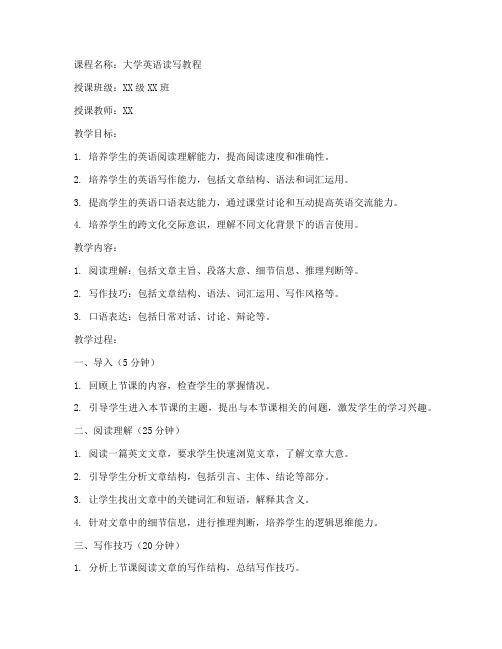
课程名称:大学英语读写教程授课班级:XX级XX班授课教师:XX教学目标:1. 培养学生的英语阅读理解能力,提高阅读速度和准确性。
2. 培养学生的英语写作能力,包括文章结构、语法和词汇运用。
3. 提高学生的英语口语表达能力,通过课堂讨论和互动提高英语交流能力。
4. 培养学生的跨文化交际意识,理解不同文化背景下的语言使用。
教学内容:1. 阅读理解:包括文章主旨、段落大意、细节信息、推理判断等。
2. 写作技巧:包括文章结构、语法、词汇运用、写作风格等。
3. 口语表达:包括日常对话、讨论、辩论等。
教学过程:一、导入(5分钟)1. 回顾上节课的内容,检查学生的掌握情况。
2. 引导学生进入本节课的主题,提出与本节课相关的问题,激发学生的学习兴趣。
二、阅读理解(25分钟)1. 阅读一篇英文文章,要求学生快速浏览文章,了解文章大意。
2. 引导学生分析文章结构,包括引言、主体、结论等部分。
3. 让学生找出文章中的关键词汇和短语,解释其含义。
4. 针对文章中的细节信息,进行推理判断,培养学生的逻辑思维能力。
三、写作技巧(20分钟)1. 分析上节课阅读文章的写作结构,总结写作技巧。
2. 分组讨论,让学生根据所学技巧,尝试写一段短文。
3. 教师点评,指出学生的优点和不足,提供修改建议。
四、口语表达(20分钟)1. 让学生就阅读文章中的某个话题进行讨论,锻炼口语表达能力。
2. 进行角色扮演,模拟实际场景,提高学生的交际能力。
3. 教师点评,鼓励学生积极参与,提高口语水平。
五、课堂小结(5分钟)1. 总结本节课所学内容,强调重点和难点。
2. 布置课后作业,包括阅读文章、写作练习和口语练习。
教学评价:1. 阅读理解:通过课后作业和课堂测试,评价学生的阅读理解能力。
2. 写作技巧:通过学生写作练习和教师点评,评价学生的写作水平。
3. 口语表达:通过课堂讨论和角色扮演,评价学生的口语表达能力。
教学反思:1. 教师应根据学生的实际情况,调整教学进度和难度。
大学英语读写教程第册unit阅读理解三篇

大学英语读写教程第册u n i t阅读理解三篇公司内部档案编码:[OPPTR-OPPT28-OPPTL98-OPPNN08]unit 8Part 1 Reading comprehensionDirections: Read the following passages carefully. Each passage is followed by some questions or unfinished sentences. For each of them there arefour choices marked A, B, C, and D. Choose the best answer to each question.Questions 1 to 5 are based on the same passage or dialog.Manners evolved differently in different cultures. In earlier times there was a tendency for manners to become increasingly formal, and this was often viewed as progress. In the 18th and 19th centuries having good manners was seen as an important part of one's education and social class, and it was necessary to be taken as a lady or a gentleman to get ahead in the world.In the 20th and 21st centuries, manners have gradually become more relaxed and informal. The hosting of dinners and other social gatherings are no longer the exclusive privilege of the wealthy elite (精英), and private clubs are being gradually replaced by more open meeting places. So the manners of the salon (沙龙) are gradually combining with the manners of the pub. Clothing is a good indication of the changes in manners, as can be seen in the following examples.It is surprising that the wearing of hats indoors by males is once again becoming acceptable. Students in North America often wear baseball caps to class. In many countries the wearing of hats indoors by males was once acceptable even in very polite society, but over the years this became considered as a lower-class behavior and was thus discouraged in both the middle and upper classes. The young people who wearhats indoors do not realize they are actually restarting a very old cultural tradition.A comparable development for females is the wearingof jeans. Many females now wear jeans on a daily basis, either at home or at work. Some see this as a symbolic declaration that they are now modern women, not girls or ladies. Some girls, like boys, wear baseball caps both indoors and outdoors.Sneakers and shorts are now acceptable for either males or females in a variety of non-athletic situations. Some companies have rules requiring informal dress such as jeans or sneakers on Fridays (called "dress-down Friday" or "casual Friday"), and others permit it almost all the time. In these companies, and many others, it is acceptable to call the bosses by their first names.1.What does the passage mainly talk aboutA. Changes of manners over time.B. Formal manners in the earlier times.C. Different manners in different cultures.D. Development of manners in different classes.2.In the 20th and 21st centuries, _________.A. manners are not as formal as in the pastB. manners in a pub are getting more and moreformalC. proper clothing is a good indication of goodmannersD. rich people no longer behave formally in socialgatherings3.According to the passage, "the manners of thesalon" in paragraph 2 most likely refers to__________.A. Formal manners of drinking.B. Informal manners of drinking.C. Formal manners at social gatherings.D. Informal manners at social gatherings.4.According to the passage, nowadays wearing a hatindoors can actually be viewed as _________.A. a revolutionB. social progressC. a worsening situationD. a return to the old tradition5.According to the author, today wearing hatsindoors, and wearing jeans at work mainly indicate that _________.A. women are no longer inferior to menB. people no longer pay attention to dressingdetailsC. people are getting more relaxed in terms ofmannersD. some companies have lower requirements fortheir employeesQuestions 6 to 10 are based on the same passage or dialog.Between the 1950s and the early 1980s, the evolving role of Japanese women had been most obvious in their attitudes toward marriage and the family system. There had been a trend away from arranged marriages. Many young women admitted that they took paid employment mostly in order to find a husband on their own. In spite of this and other influences a 1982 figure showed that almost 40 percent of marriages were still arranged. This figure was, however, half the size of a 1955 survey which showed that almost 81 percent of marriages were arranged. Once married, many women in the early 1980s continued to work, and increasingly they returned to work after childbirth, something which was hard to imagine a generation before. A woman's role in the family was evolving as well, becoming more and more dominant.Women had sought more personal satisfaction fromtheir lives since 1950s. In the beginning ofthe1980s, during their lives before marriage women made up an almost free-wheeling (随心所欲) part ofJapanese society. A survey of new brides reportedthat only 12 percent expected their marriage to be happy. At that time, Japanese still regarded marriage not as the peak of a romance but as a duty that was primarily social and practical in significance. As a result, Japanese women took full advantage of their years before marriage. Most women remained at home while working, living with their family in a sort of extended dependency. Japanese women, however, must be careful to maintain themselves within acceptable social standards, one woman being told, "If you act like that, you will not be wanted as a bride."Once married a Japanese women found herself in a role opposite of the perceived sex roles in Japan – the female was dominant in the house. The relationship between the partners of a Japanese marriage clearly showed the evolving role of women. It must be remembered that a short one hundred years ago the attitude toward women was that "In everything she must obey her husband". By the early 1980s the role of women had changed: A Japanese woman had almost unquestioned power within the family system oftoday's Japan.6.What is the passage mainly aboutA. Changes in the role of Japanese women.B. Changes in the styles of Japanese marriages.C. Japanese women's struggle for independence.D. Japanese women's increased power in theirfamilies.7.What did the author say about Japanese womenbefore the 1950sA. Many women continued to work after marriage.B. A majority of women had their marriagesarranged.C. Only less than half of women had arrangedmarriages.D. Many women went to work in order to find ahusband.8.What was marriage in many Japanese people's eyesin the early 1980sA. It was the end of their romance.B. It was the beginning of a happy life.C. It was a social responsibility one has tofulfill.D. It was the highest point of their romanticrelationship.9.Which of the following was the main cause formost Japanese women in the early 1980s to takefull advantage of their years before marriageA. They believed they would no longer have ahappy life after marriage.B. They knew they could not be as dominant asbefore after getting married.C. They should not go beyond acceptable socialstandards after marriage.D. They would no longer have time to work aftermarriage.10."The perceived sex roles" in the last paragraphmost probably refers to the fact that thewife_________.A. had to obey the husband in the familyB. had to support the husband and his familyC. could make decisions on everything in thefamilyD. could question some of the husbands' decisions Questions 11 to 15 are based on the same passage or dialog.Leadership is the ability of a person to guide people in a group toward achieving a task at hand. I believe that leaders are made; they are not born and a person can always be a good leader if he makes full use of the following list of leadership strengths.Firstly, task execution (实施) is one of the most important leadership strengths. Coming up with a brilliant idea and executing that idea are twocompletely different things. Bringing an idea to life is a lot easier said than done. An idea really comes to life only when it is executed to perfection. For this, you need to be a team player. There is a fine line between having followers that follow you out of respect and having followers that follow you because they have no choice. Any kind of disagreement in the team will affect the end result and the efficiency of performing the task.Secondly, before you go on to put any kind of strategy into place, you need to understand and envision what you wish to achieve. This is important because the expectations of the entire group willride on your shoulders. Thus, one of the important leadership strengths is to have a very clear vision about how to go about a task at hand, keeping the long-term and short-term goals and consequences in mind. You need to be practical yet optimistic about the possibilities involved in any task and must take into consideration all the risks involved.Thirdly, being the leader does not mean that you own the people you work with. Many people tend to get carried away and do not listen to their team members. This can go against them as the team members then tend to lose respect for their leader. You need to genuinely listen to your team members because they are the only ones that will tell you if you go wrong at any point of time. Furthermore, listening will make sure that you connect with your team members on a personal level, which will improve the performance of your team greatly.11.Which of the following is NOT mentioned in thepassage as one of the leadership strengthsA. Lending an ear to team members.B. Performing a task in a perfect way.C. Accepting mistakes with good grace.D. Planning for the future with a clear goal.12.According to Paragraph 2, a good leader should___________.A. lead his followers with absolute authorityB. make his followers follow him out of respectC. be able to find out who is a true follower inthe teamD. focus on creating new ideas instead ofexecuting them13.What does "envision" most probably mean inParagraph 3A. To remain optimistic about future results.B. To focus all his attention on long-term goals.C. To meet the expectations of the entire teammembers.D. To forecast the possible achievements andconsequences.14.Which of the following should be avoided as agood leaderA. Holding a realistic attitude.B. Considering short-term goals.C. Thinking about the bad results of a plan.D. Ignoring disagreement from his team members.15.What is the author's attitude about becoming agood leaderA. You can be a good leader if you have talents.B. You can be a good leader if you have a goodteam.C. You can be a good leader if you acquire theessential skills.D. You can be a good leader as long as you aredetermined to be one.。
新视野大学英语读写教程(第二版)第一册课文原文
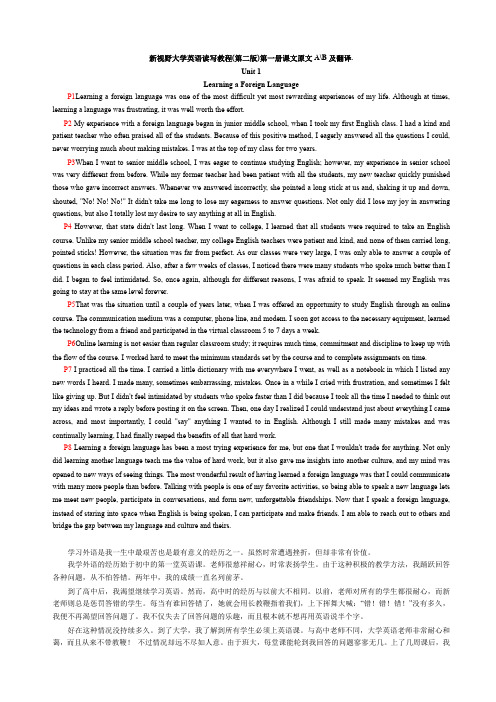
新视野大学英语读写教程(第二版)第一册课文原文A\B及翻译.Unit 1Learning a Foreign LanguageP1Learning a foreign language was one of the most difficult yet most rewarding experiences of my life. Although at times, learning a language was frustrating, it was well worth the effort.P2 My experience with a foreign language began in junior middle school, when I took my first English class. I had a kind and patient teacher who often praised all of the students. Because of this positive method, I eagerly answered all the questions I could, never worrying much about making mistakes. I was at the top of my class for two years.P3When I went to senior middle school, I was eager to continue studying English; however, my experience in senior school was very different from before. While my former teacher had been patient with all the students, my new teacher quickly punished those who gave incorrect answers. Whenever we answered incorrectly, she pointed a long stick at us and, shaking it up and down, shouted, "No! No! No!" It didn't take me long to lose my eagerness to answer questions. Not only did I lose my joy in answering questions, but also I totally lost my desire to say anything at all in English.P4However, that state didn't last long. When I went to college, I learned that all students were required to take an English course. Unlike my senior middle school teacher, my college English teachers were patient and kind, and none of them carried long, pointed sticks! However, the situation was far from perfect. As our classes were very large, I was only able to answer a couple of questions in each class period. Also, after a few weeks of classes, I noticed there were many students who spoke much better than I did. I began to feel intimidated. So, once again, although for different reasons, I was afraid to speak. It seemed my English was going to stay at the same level forever.P5That was the situation until a couple of years later, when I was offered an opportunity to study English through an online course. The communication medium was a computer, phone line, and modem. I soon got access to the necessary equipment, learned the technology from a friend and participated in the virtual classroom 5 to 7 days a week.P6Online learning is not easier than regular classroom study; it requires much time, commitment and discipline to keep up with the flow of the course. I worked hard to meet the minimum standards set by the course and to complete assignments on time.P7 I practiced all the time. I carried a little dictionary with me everywhere I went, as well as a notebook in which I listed any new words I heard. I made many, sometimes embarrassing, mistakes. Once in a while I cried with frustration, and sometimes I felt like giving up. But I didn't feel intimidated by students who spoke faster than I did because I took all the time I needed to think out my ideas and wrote a reply before posting it on the screen. Then, one day I realized I could understand just about everything I came across, and most importantly, I could "say" anything I wanted to in English. Although I still made many mistakes and was continually learning, I had finally reaped the benefits of all that hard work.P8 Learning a foreign language has been a most trying experience for me, but one that I wouldn't trade for anything. Not only did learning another language teach me the value of hard work, but it also gave me insights into another culture, and my mind was opened to new ways of seeing things. The most wonderful result of having learned a foreign language was that I could communicate with many more people than before. Talking with people is one of my favorite activities, so being able to speak a new language lets me meet new people, participate in conversations, and form new, unforgettable friendships. Now that I speak a foreign language, instead of staring into space when English is being spoken, I can participate and make friends. I am able to reach out to others and bridge the gap between my language and culture and theirs.学习外语是我一生中最艰苦也是最有意义的经历之一。
新视野大学英语读写教程1答案
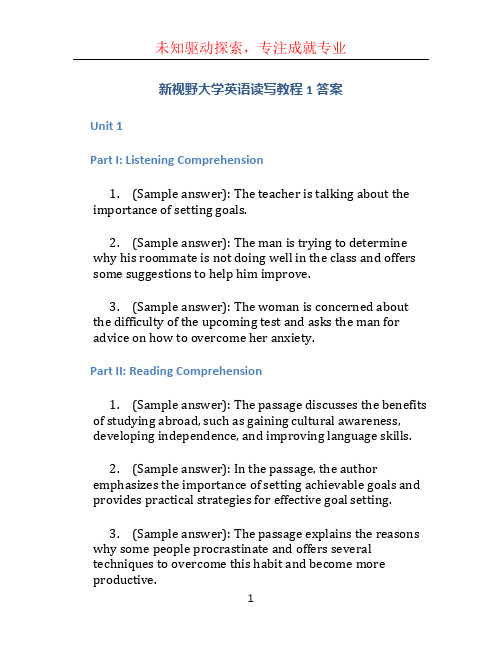
新视野大学英语读写教程1答案Unit 1Part I: Listening Comprehension1.(Sample answer): The teacher is talking about the importance of setting goals.2.(Sample answer): The man is trying to determine why his roommate is not doing well in the class and offers some suggestions to help him improve.3.(Sample answer): The woman is concerned about the difficulty of the upcoming test and asks the man for advice on how to overcome her anxiety.Part II: Reading Comprehension1.(Sample answer): The passage discusses the benefits of studying abroad, such as gaining cultural awareness, developing independence, and improving language skills.2.(Sample answer): In the passage, the author emphasizes the importance of setting achievable goals and provides practical strategies for effective goal setting.3.(Sample answer): The passage explains the reasons why some people procrastinate and offers several techniques to overcome this habit and become more productive.Part III: Vocabulary1.(Sample answer):–Potential (adj.): describing or showing the possibility of developing something in the future.–Motivation (n.): the reason or reasons one has for acting or behaving in a particular way.–Objective (n.): a goal or aim.–Overcome (v.): succeed in dealing with (a problem or difficulty).–Distraction (n.): a thing that prevents someone from concentrating on something else.2.(Sample answer):–Anxiety (n.): a feeling of apprehension or unease.–Estimation (n.): a rough calculation or rough judgment.–Satisfactory (adj.): fulfilling expectations or needs; acceptable, though not outstanding or perfect.–Procrastination (n.): the action of delaying or postponing something.–Prioritize (v.): designate or treat (something) as more important than other things.Part IV: Error Correction1.(Sample answer):–Original: She learn English since she was a child.–Corrected: She has been learning English since she was a child.2.(Sample answer):–Original: I have eaten lunch at 12 a.m.–Corrected: I had lunch at 12 noon.Unit 2Part I: Listening Comprehension1.(Sample answer): The man is asking for directions to the nearest post office.2.(Sample answer): The woman is discussing the advantages and disadvantages of online shopping with her friend.3.(Sample answer): The speaker is explaining the steps to follow when applying for a visa.Part II: Reading Comprehension1.(Sample answer): The passage compares Western and Eastern communication styles, highlighting the directness and individualism of Western communication and the indirectness and collectivism of Eastern communication.2.(Sample answer): In the passage, the author discusses the benefits of traveling and provides insight on how it broadens one’s perspective, enhances self-awareness, and promotes personal growth.3.(Sample answer): The passage explores the phenomenon of culture shock, explains its causes and symptoms, and offers advice on how to cope with it through immersion and an open mind.Part III: Vocabulary1.(Sample answer):–Navigate (v.): plan and direct the route or course of a ship, aircraft, or other form oftransportation.–Authentic (adj.): of undisputed origin; genuine.–Accommodate (v.): provide lodging or sufficient space for.–Barrier (n.): a fence or other obstacle that prevents movement or access.–Comprehend (v.): grasp mentally; understand.2.(Sample answer):–Integrate (v.): combine (one thing) with another so that they become a whole.–Encounter (v.): unexpectedly experience or be faced with (something difficult or hostile).–Etiquette (n.): the customary code of polite behavior in society or among members of a particularprofession or group.–Underestimate (v.): estimate (something) to be smaller or less important than it actually is.–Fluent (adj.): able to express oneself easily and articulately.Part IV: Error Correction1.(Sample answer):–Original: I went to library yesterday.–Corrected: I went to the library yesterday.2.(Sample answer):–Original: The train have already left.–Corrected: The train has already left.These are just sample answers to the questions and exercises in the New Horizon’s College English Reading and Writing Coursebook 1. It is important to note that answers may vary, and it’s recommended to refer to the official answer key provided by the textbook publisher for complete accuracy.。
- 1、下载文档前请自行甄别文档内容的完整性,平台不提供额外的编辑、内容补充、找答案等附加服务。
- 2、"仅部分预览"的文档,不可在线预览部分如存在完整性等问题,可反馈申请退款(可完整预览的文档不适用该条件!)。
- 3、如文档侵犯您的权益,请联系客服反馈,我们会尽快为您处理(人工客服工作时间:9:00-18:30)。
Where to find books (a) in a bookstore (b) in a library
Ⅰ. About the Author
Part 2 Theme-related Reading
Anna Quindlen is the Pulitzer Prize-winning journalist and best-selling novelist. She joined Newsweek as a contributing editor in October, 1999, succeeding the late Meg Greenfield. Her column appears every other week on the magazine’s back page.
Part 2 Theme-related Reading
Ⅱ. Information Related to the Text
1.Steven Paul Jobs: Steven Paul Jobs (1955—2011) was an American businessman and inventor widely recognized as a charismatic pioneer of the personal computer revolution. He was the co-founder, chairman, and chief executive officer of Apple Inc. Jobs was also the co-founder and previously served as chief executive of Pixar Animation Studios; he became a member of the board of directors of The Walt Disney Company in 2006, following the acquisition of Pixar by Disney.
3. “It is a truth universally acknowledged”: The complete sentence is “It is a truth universally acknowledged that a single man in possession of a good fortune must be in want of a wife.” It is the beginning sentence of the novel Pride and Prejudice by Jane Austen.
海
大学英语 读写教程 II
Unit 2
Education
The book is the ship across the sea of time.
——Francis Bacon
Contents
Part I Pre-reading Activities Part II Theme-related Reading Text A Part III Theme-related Reading Text B Part IV Writing Practice Part V After-class Activities
Jobs announced his resignation due to health problems in August 2011. On October 5, 2011, he died at his home in Palo Alto, California, aged 56.
Part 2 Theme-related Reading
(c) on the Internet
Part 2 Theme-related Reading
Part II Theme-related Reading
Text A
Ⅰ. About the Author Ⅱ. Information Related to the Text
Ⅲ. Text A Turning the Page
Part 1 Pre-reading Activities
Part I Pre-reading Activities
1. Listen to the passage E-publishing Overview and then discuss
with your classmates the topic: Comparison between traditional
reading and e-reading.
Script
ramification n. : 分支
familiarize vt. : 使熟悉,使亲近
ቤተ መጻሕፍቲ ባይዱ
print-on-demand(POD) : 按需出版
astounding a. : 令人惊奇的
Part 1 Pre-reading Activities
2.YouTube: YouTube is a popular video sharing website where users can upload, view and share video clips. YouTube was created in mid-February 2005 by three former PayPal employees. The San Bruno-based service uses Adobe Flash technology to display a wide variety of video content, including movie clips, TV clips and music videos, as well as amateur content such as video blogging and short original videos.
